A winner of the Bram Stoker and World Fantasy awards, P.D. Cacek is a superb, versatile author 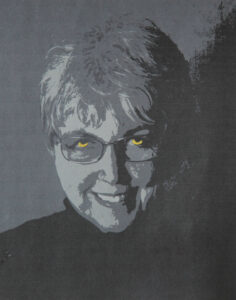 who just happens to keep a mannequin named Sebastian by her desk at all times. (More on him below). I have known her for well over twenty years, ever since she agreed to write a short fiction piece for me back in the White Wolf days, and she doesn’t hold that against me. Witty, wise and wonderful, here’s Five For Writing with P.D. Cacek.
who just happens to keep a mannequin named Sebastian by her desk at all times. (More on him below). I have known her for well over twenty years, ever since she agreed to write a short fiction piece for me back in the White Wolf days, and she doesn’t hold that against me. Witty, wise and wonderful, here’s Five For Writing with P.D. Cacek.
(Just cover your ears when you get to the last question. Trust me.)
1-Werewolves or vampires? Which do you prefer and why?
Hmmm…hard choice, but I think I prefer werewolves over vampires…and that’s not because my grandfather was from the Carpathian region of Romania and sounded like Bela Lugosi, or that I’m allergic to garlic and have a tendency to burn in the sun. It’s not. Really.
Vampires are fine, but they tend to be a bit more arrogant about themselves and their needs, seeming to delight 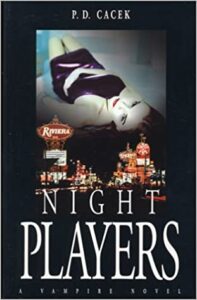 in the hunt and flaunting their total disregard for their formal corporal selves (unless I’ve written them*). Okay, so you’ve lived centuries…get over yourselves. I feel werewolves, even though they are monsters, still retain more of their “humanness” for the simple reason that not only are as much a victim of their curse as the poor (slow) souls they hunt, but are doomed to live with the knowledge of what they have become. They have no power to
in the hunt and flaunting their total disregard for their formal corporal selves (unless I’ve written them*). Okay, so you’ve lived centuries…get over yourselves. I feel werewolves, even though they are monsters, still retain more of their “humanness” for the simple reason that not only are as much a victim of their curse as the poor (slow) souls they hunt, but are doomed to live with the knowledge of what they have become. They have no power to
fight the transformation that turns them into ferocious, ravening beast (again, unless I’m writing them**).
And the fact that I sometimes get a little twitchy around the time of the full moon and love my steaks so rare they might be could be considered bleeding has nothing to do with my answer. Really.
[* NIGHT PRAYERS, NIGHT PLAYERS. ** CANYONS. Yes, they’re plugs…sue me.]
2-You bounce back and forth between Colorado and Pennsylvania. Which is more conducive to horror writing?
Although I do the majority of my “keyboarding” in Pennsylvania where my desktop computer is, I have been known to grab a pen (!) and legal pad (!!) and write longhand (!!!) in Colorado. It doesn’t matter where I am when inspiration strikes, and I’ve used both states as backdrops. [Stand by for another plug] I set SECOND CHANGES in both CO and PA, (CA for SECOND LIVES) and while bunny-sitting in the small mountain town of Nederland, Colorado (Home of Frozen Dead Guy Days) used it—modified for creativity’s sake—as the setting for my current work in progress.
3-You’re an experienced first reader for a publisher. What is it like being the editor’s first line of 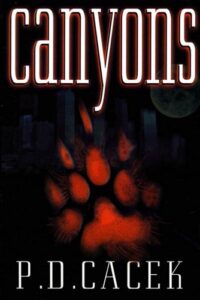 defense?
defense?
Sometimes it’s very, very hard.
I know all too well what it’s like to put your heart, soul, and, on occasion, spleen into a novel which, after countless hours spent polishing it, reworking it and suffering the critiques from readers who may or may not “understand” what you’re trying to do, you send it to a publisher only to have it rejected. It’s the worst feeling in the world and I think about that each and every time I read a submission.
In a perfect world, each manuscript I read would be a masterpiece…but this is not a perfect world and all too often the hopeful author’s hopes and skill are not equally matched. I was once of the opinion that “anyone can write” and as far as it goes, that part is true: anyone can put words down on paper or screen. The question then becomes should they? Sometimes the answer is very obvious and then it’s my job to take the hit, so to speak. But there are also times when gems appear and I get to forward it with a “YES! READ THIS!”
And those make it all worthwhile.
4-Your upcoming novel has a unique premise. Where did it come from?
[This plug was requested, so shush!]
My upcoming novel from Flame Tree Press is about the relationship between a man and his world-famous photographer mother…and their relationship with a small mannequin named SEBASTIAN.
First, a little bit of personal background of yours truly: I don’t like dolls. Never did, although, beings a female child, I was given a number of them from baby dolls to those high fashion icons with oversized…endowments.
And while I don’t suffer from automatonophobia, I’m not overly found of mannequins. Always thought they’re just a little too creepy, especially the molded plastic, faceless kind.
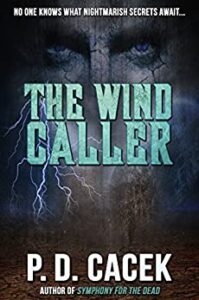 Another personal bit of info is that I love what I call “vulching,” which, in my case, is to swoop in like a vulture on a “Going Out Of Business” sales in search of bargains. Usually I come away with a few things, so when I saw that the JC Pennys in the King of Prussia mall was going out of business, I swooped.
Another personal bit of info is that I love what I call “vulching,” which, in my case, is to swoop in like a vulture on a “Going Out Of Business” sales in search of bargains. Usually I come away with a few things, so when I saw that the JC Pennys in the King of Prussia mall was going out of business, I swooped.
The “bones” had been picked pretty well clean by the time I got there, but I wandered around a bit and found a few things. While standing in line I noticed a herd, flock, assemblage of mannequins along one wall behind an EVERYTHING MUST GO/60-75% OFF sign. All of the mannequins were adult-sized (made of molded while plastic, faceless but with enough gender features to distinguish male from female)…with one minor, and very small exception. It was near the middle of the flock/herd, half hidden behind the legs of those in front of it…about the size of a two-year old, faceless, child.
I didn’t think anything of it until the cashier rang up my purchases and asked if there was anything…at which point I asked if the little mannequin was for sale and how much it cost. It was and cost me a whopping $36.00.
So I bought it and the moment I picked it up, not only did the whole novel popped into my head: beginning, middle, and end, but also his name: Sebastian.
Sebastian stands next to my desk as I write this, dressed for the season. What? You want I should have a naked mannequin in my office? I’ll have you know that Sebastian has a full wardrobe, plus a couple Halloween costumes. My hope is to one day do a SEBASTIAN calendar which means he needs those outfits, right? Right.
5-You’ve notably given public performances as a banshee at a festival in Pennsylvania. How do you get that job?
By accident.
A bunch of us were whooping it up at the World Fantasy Convention in Minneapolis (back in 2002) where I shared the stage with Neil Gaiman and others, to perform a script in hand radio play of Gene Wolfe’s “The Tree Is My Hat.” My character was Mary, who, as it turns out, gets eaten by a shark god.
Our first read-thru went well but when I got to the point where Mary gets eaten, the stage direction said scream. Now, I’d never screamed professionally before this, but I thought ‘how hard can it be?’ As it turned out, not hard at all. So I screamed. I mean I screamed as was befitting a woman being eaten by a shark god. Method acting. I honestly didn’t realize how loud (and long) my scream was until the doors at the opposite end of the massive room burst open and two hotel security guards raced in.
And the rest, as they say, is history.
Gene Wolfe seemed pleased with the show and only a few people left the play rubbing their ears. I did offer to teach Neil’s daughter the scream but he politely refused on her behalf.
If you’re ever in Phoenixville, PA, the second weekend in July, head over to The Colonial Theater for BLOBFEST and hear for yourself.
And there you have it, folks – P.D. Cacek, author, reader, and banshee. Many thanks to her for taking the time to answer some unusual questions!
Next week, strap in for Five For Writing with Todd Keisling, author of Devil’s Creek!
 1-How did you get into writing?
1-How did you get into writing? 3-You mixed the rural and the cosmic to great effect in Devil’s Creek. How did you come up with that pairing?
3-You mixed the rural and the cosmic to great effect in Devil’s Creek. How did you come up with that pairing?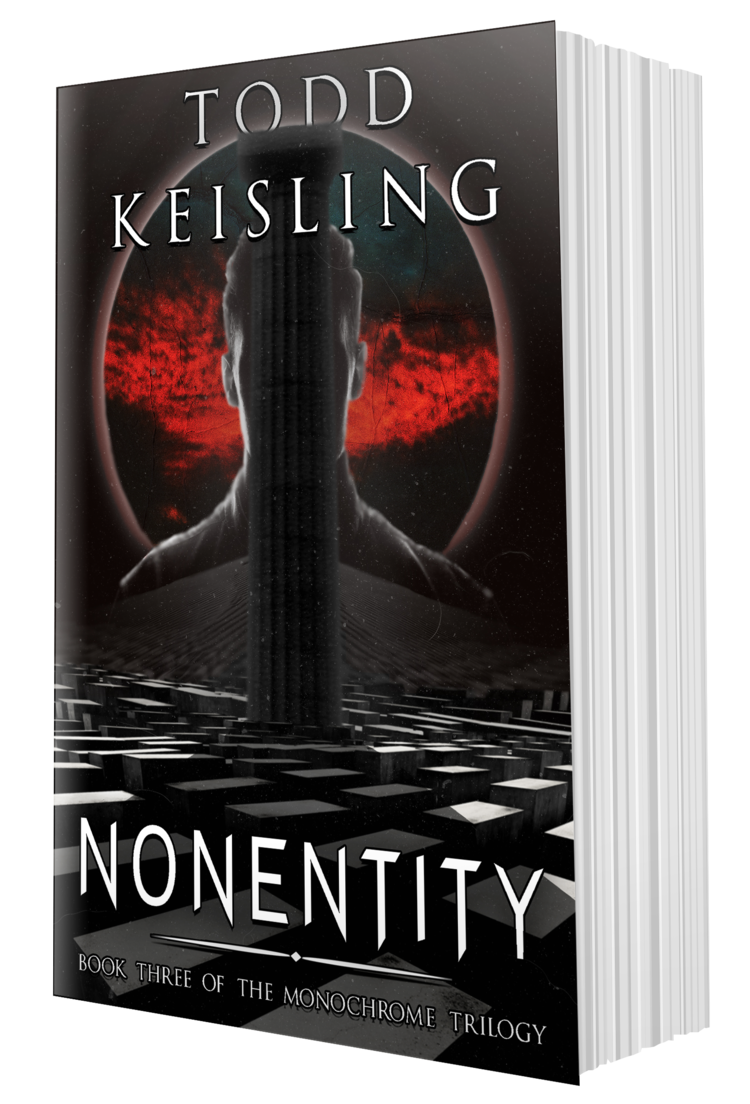 5-There was a big gap between books two and three of the Monochrome trilogy. What made you decide to pick that back up?
5-There was a big gap between books two and three of the Monochrome trilogy. What made you decide to pick that back up? who just happens to keep a mannequin named Sebastian by her desk at all times. (More on him below). I have known her for well over twenty years, ever since she agreed to write a short fiction piece for me back in the White Wolf days, and she doesn’t hold that against me. Witty, wise and wonderful, here’s Five For Writing with P.D. Cacek.
who just happens to keep a mannequin named Sebastian by her desk at all times. (More on him below). I have known her for well over twenty years, ever since she agreed to write a short fiction piece for me back in the White Wolf days, and she doesn’t hold that against me. Witty, wise and wonderful, here’s Five For Writing with P.D. Cacek. in the hunt and flaunting their total disregard for their formal corporal selves (unless I’ve written them*). Okay, so you’ve lived centuries…get over yourselves. I feel werewolves, even though they are monsters, still retain more of their “humanness” for the simple reason that not only are as much a victim of their curse as the poor (slow) souls they hunt, but are doomed to live with the knowledge of what they have become. They have no power to
in the hunt and flaunting their total disregard for their formal corporal selves (unless I’ve written them*). Okay, so you’ve lived centuries…get over yourselves. I feel werewolves, even though they are monsters, still retain more of their “humanness” for the simple reason that not only are as much a victim of their curse as the poor (slow) souls they hunt, but are doomed to live with the knowledge of what they have become. They have no power to defense?
defense? Another personal bit of info is that I love what I call “vulching,” which, in my case, is to swoop in like a vulture on a “Going Out Of Business” sales in search of bargains. Usually I come away with a few things, so when I saw that the JC Pennys in the King of Prussia mall was going out of business, I swooped.
Another personal bit of info is that I love what I call “vulching,” which, in my case, is to swoop in like a vulture on a “Going Out Of Business” sales in search of bargains. Usually I come away with a few things, so when I saw that the JC Pennys in the King of Prussia mall was going out of business, I swooped. 1-You tend to write in series instead of standalone books. What’s the appeal of a series to you?
1-You tend to write in series instead of standalone books. What’s the appeal of a series to you? unusual traits that make him unique among everyone else he interacts with, but it isn’t really until the third book that it becomes clear why he is the way he is. I kept trying to find a place to explain it all in that first book. There just wasn’t space. It wasn’t relevant to the story that was unfolding, and the amount of context that readers would have needed for it to make sense was just too much to fit in as an information dump. But after a couple of books’ worth of exploring the state of the Duskwalker world, I felt like readers had lived in it long enough that the third book could reveal that background in a natural way that was integral to the story instead of an “As you know, Bob, Three is special because …” kind of thing.
unusual traits that make him unique among everyone else he interacts with, but it isn’t really until the third book that it becomes clear why he is the way he is. I kept trying to find a place to explain it all in that first book. There just wasn’t space. It wasn’t relevant to the story that was unfolding, and the amount of context that readers would have needed for it to make sense was just too much to fit in as an information dump. But after a couple of books’ worth of exploring the state of the Duskwalker world, I felt like readers had lived in it long enough that the third book could reveal that background in a natural way that was integral to the story instead of an “As you know, Bob, Three is special because …” kind of thing. Mostly a direct challenge from my agent, the esteemed Sam Morgan. After the Outriders books, when we were discussing what to tackle next, he said he’d really like to see what I could do on a more epic scale. My first two series were focused on small groups of people, so when Sam said “how about more epic”, I went from “small group with personal stakes” to “galaxy spanning empire with the fate of the human race in the balance”. It was quite a challenge for me and really stretched me creatively, but I’m really glad that Sam pushed me to give it a shot.
Mostly a direct challenge from my agent, the esteemed Sam Morgan. After the Outriders books, when we were discussing what to tackle next, he said he’d really like to see what I could do on a more epic scale. My first two series were focused on small groups of people, so when Sam said “how about more epic”, I went from “small group with personal stakes” to “galaxy spanning empire with the fate of the human race in the balance”. It was quite a challenge for me and really stretched me creatively, but I’m really glad that Sam pushed me to give it a shot. 4-The defining trait of many of your characters is utter competence. What’s the appeal of writing
4-The defining trait of many of your characters is utter competence. What’s the appeal of writing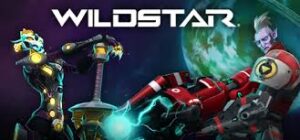 2-What do you think are the main differences between TTRPG and video game writing?
2-What do you think are the main differences between TTRPG and video game writing? 3-What were the challenges in writing for Rainbow Six: Siege, a game that doesn’t necessarily have a traditional narrative structure?
3-What were the challenges in writing for Rainbow Six: Siege, a game that doesn’t necessarily have a traditional narrative structure?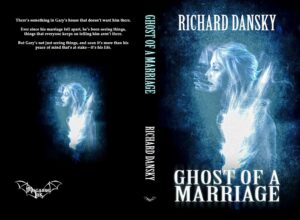
 1-You’ve been involved with Vampire: The Masquerade for over two decades. How has it changed in that time, and how has your approach to it changed?
1-You’ve been involved with Vampire: The Masquerade for over two decades. How has it changed in that time, and how has your approach to it changed?